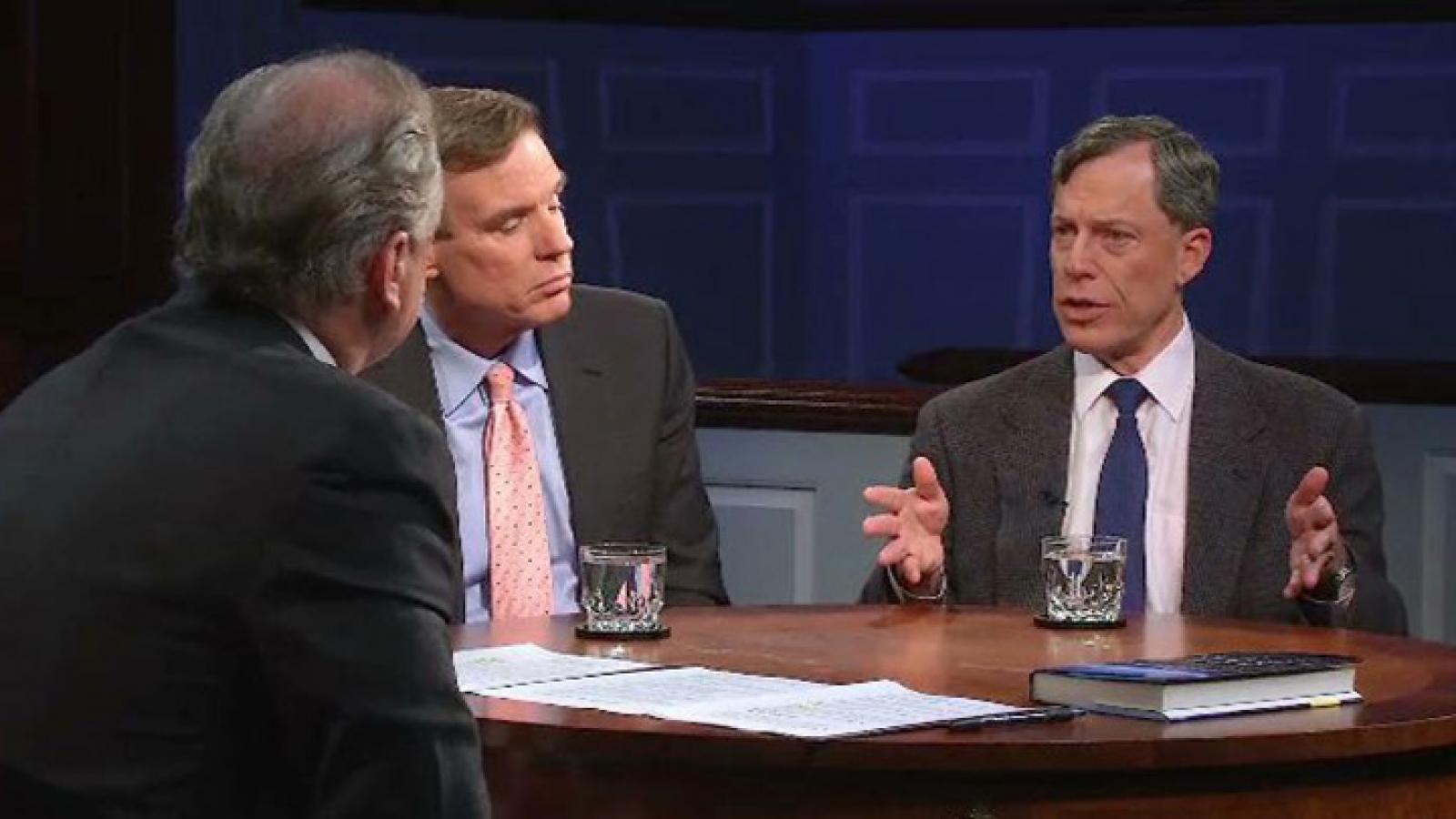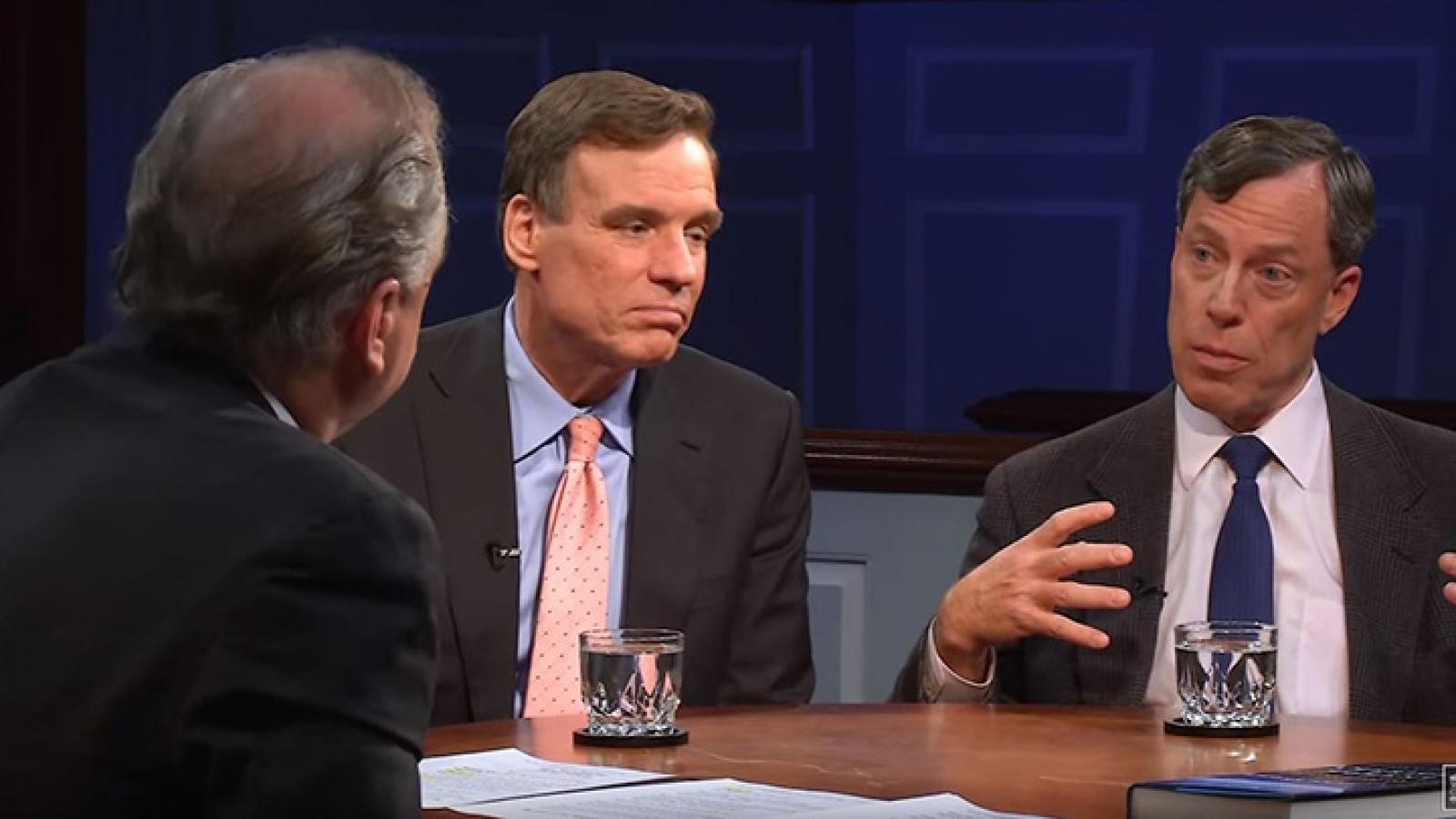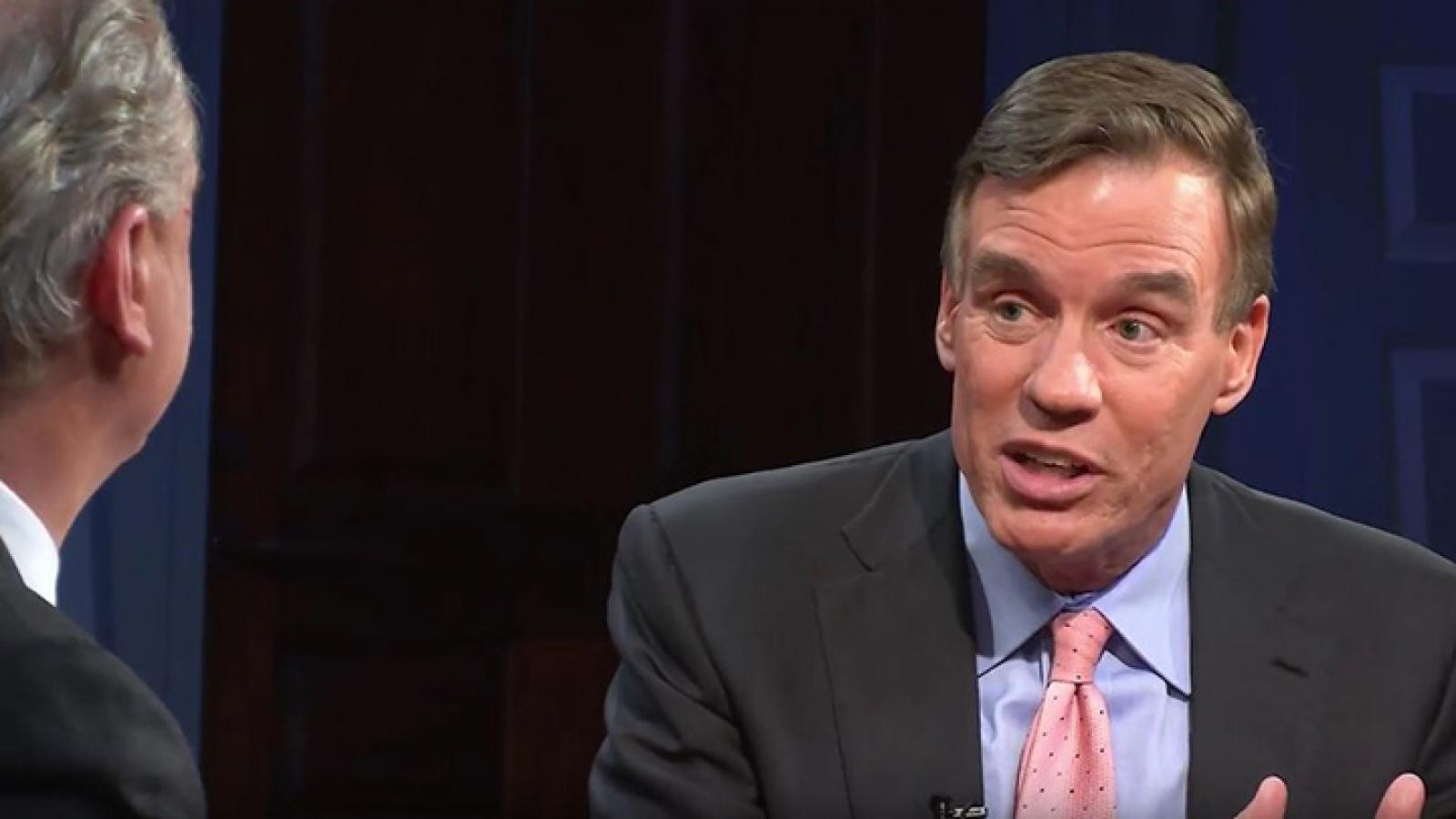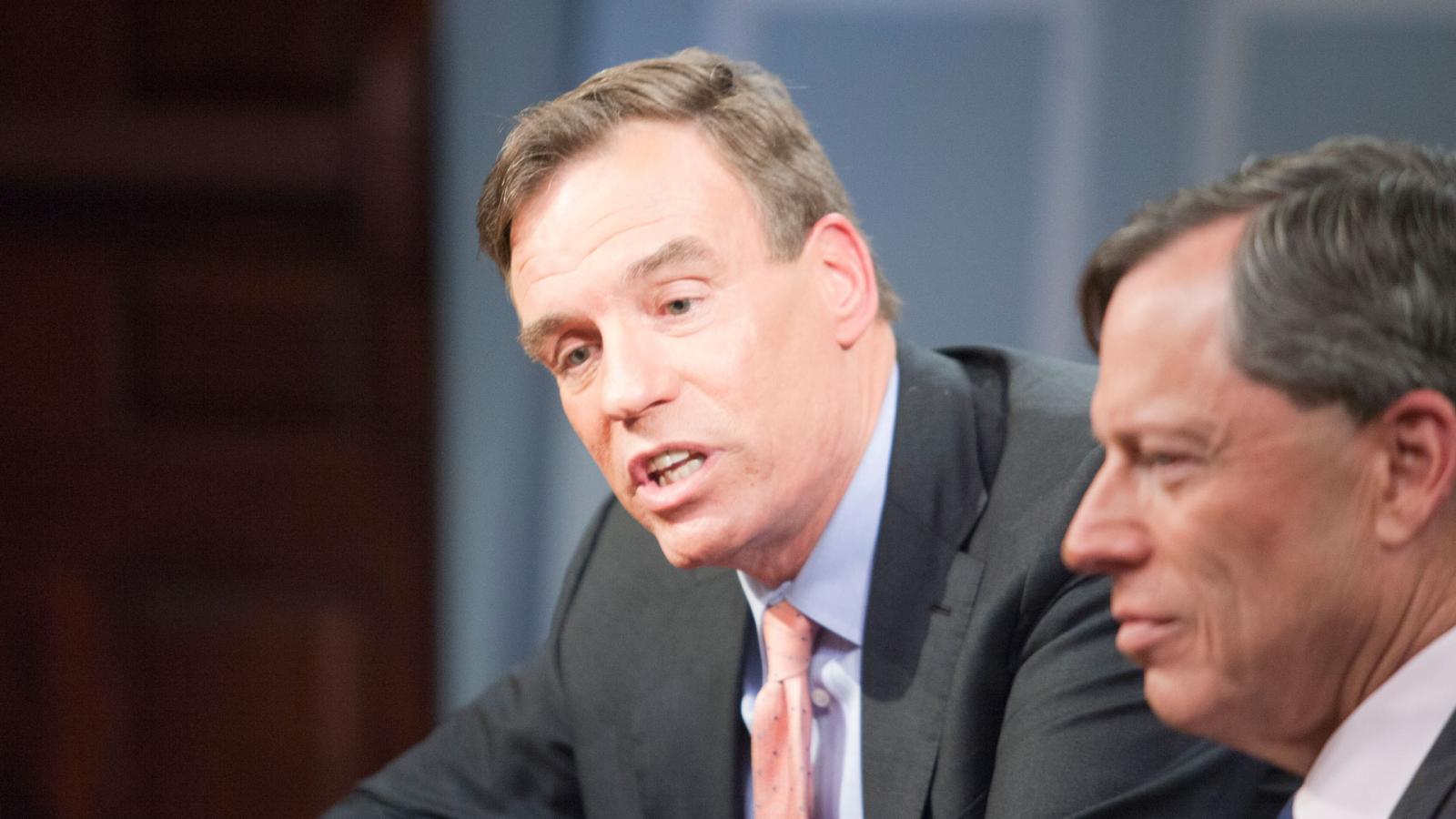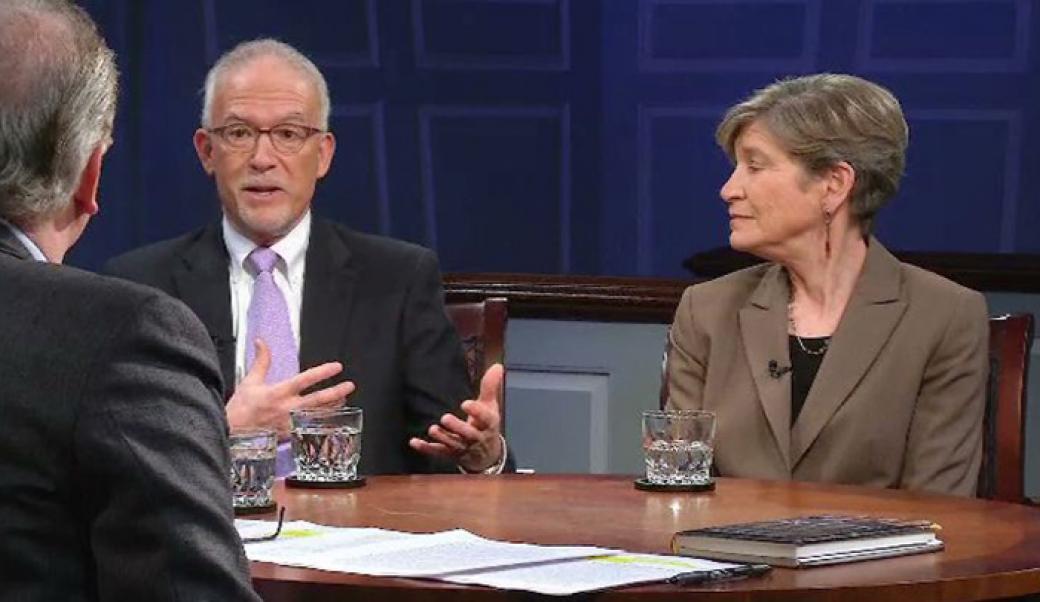About this episode
May 20, 2016
Senator Mark Warner & Philip Zelikow
Senator Mark Warner was elected to the U.S. Senate in November 2008 and serves on the Senate Finance, Banking, Budget, and Intelligence committees. From 2002 to 2006, he served as governor of Virginia. Philip Zelikow is the White Burkett Miller Professor of History at the University of Virginia and a faculty associate at the Miller Center. Previously, he was a career diplomat, posted overseas and in Washington, including service on the NSC staff for President George H. W. Bush. Together they look at how the working world is changing—and what we can do to embrace the trends.
Transcript
0:41 Douglas Blackmon: Welcome back to American Forum. We live in a world in which new and changing technology seems to be transforming every dimension of our human society. The economic cogs and gears are being replaced by digital transfers of information, multi-dimensional printers, new intellectual skills, robotics, work and task sharing like Uber and a general acceleration of the evolution of work itself. Where is all this dramatic change taking us? What will the nature of work be for most Americans and other citizens of the world? And are we preparing adequately for the gigantic changes? Our guests today are two important voices who have been actively studying these changes and advocating for a thoughtful approach to managing the way work is being revolutionized and society along with it. Senator Mark Warner has served in the U.S. Senate since 2008, and prior to that was governor of Virginia for four years. Prior to entering the political sphere, he was an early and successful investor in the cellular phone industry. Also joining us is Philip Zelikow, a professor of history with a long record of service as a diplomat, scholar and author. He served in the Bush administration and was executive director of the 9/11 commission. He is the author of many books, most recently of America’s Moment: Creating Opportunity in the Connected Age. A compilation of contributions from a wide spectrum of American intellectuals and business leaders about our dramatically changing economy. Thanks for being here.
Senator Mark Warner: Thank you Doug.
Philip Zelikow: Thank you Doug
Blackmon: So, the book and the the sorts of things that you’ve been talking about, Senator in your work as well are really about these huge changes that are happening all around us and that sometimes seem to be so fast that we don’t entirely understand where they may all be headed, but one of the things that you talk about is the gig economy. But what exactly is that? Wh-what are we really talking about?
FACTOID: The Question: What is the Future of Work in America?
Zelikow: Well, imagine the, uh, industrial age, big business, big work places, big unions, and a big government to umpire it all.
FACTOID: Rates of union membership in U.S. are among lowest in world
That was the product of the last great economic revolution, the one we went through 100 years ago. We’re going through another economic revolution today, but instead of it all being about big business, big unions, big work places, big government to umpire it all, it’s actually about a distributed economy, about piece meal work being put together, about constantly changing jobs, and life-time education, not just assembly line education in an industrial style process. Health care is changing, education is changing, capitalism is changing. So, back then, 100 years ago, we had a huge agenda for how to rework the country to adapt. And America adapted and became the greatest nation on earth. So the question that my colleges and I in this project were all asking ourselves, Doug, is what’s the agenda this time? You know it actually is not about a top-down agenda from the national government, back then and now it’s actually a grass-roots agenda driven by private businesses, by state and local governments, and even though it’s not in the national conversation, stuff is actually happening all over America. We wanted to pull all that together and get people talking about that agenda because America can adapt and if they do, this century could also be full of promise for the country.
4:03 Blackmon: Well Senator there’s a, there’s an interesting, tension may not be exactly the word, but but there there are different things that different people are observing at the same time that all seem to be inter-related, and what I mean by that is even the current political atmosphere reflects that there’s a tremendous amount of anxiety on the parts of a really large number of Americans. Some of them then turn, uh, in the, politically turn to the right, uh, in the sort of security they’re looking for, some are turning now far to the left, uh, those are probably related to one another. So are things going in a great direction, or are they going uh going going south somehow?
Warner: Well Doug I think what Phillip has pointed out and America’s moment is that we’re going through a really dramatic transformation and I’m not sure we can, there’s good parts of it and there’s bad parts of it. But if we think back uh, I think just within the last hundred years I mean, my Dad worked for the same firm for 40 years, never made a lot of money, but he was guaranteed if he got hurt, he would get unemployment or disability at the end of the time, if he got sick there would be health care and then when he retired there’d be a pension. In effect it was almost the uh, defined benefit era. My era as a Baby Boomer was more kind of the 401K generation. Technology was changing, globalization was changing, but we still had some sense that a job was, that we might move from job to job, but it was still a set of responsibilities and there was some level of a social contract. What we’re seeing now in the 21st Century and people think about the Ubers or the Airbnbs or the Handies or Lyfts and this is just the beginning of of a whole movement that is actually able, or people can monetize on their own time, their time, their apartment, their car, their parking spot, in ways that are fairly transformative. On the good side, it creates enormous freedom and flexibility that quite honestly as a policy maker I’m not sure I fully appreciate how much and how far people will go to have that freedom and flexibility over their lives in a very complicated time. On the other hand it also creates the lack of any social insurance.
FACTOID: About half of U.S. workers lack employer retirement or pension
So all those things that came with my Dad’s generation and I had partially, the Millennials as they go through this transformation may or may not have. And before this issue gets broken into whether it’s all good or all bad, there is a real chance if we lean in to in effect reimagine the social contract in a 21st century way. And I think many of these companies realize that investing with their workers in a way may be different than the 20th century but really could be transformative.
Zelikow: See Doug all the institutions that Senator Warner is talking about those weren’t the weren’t handed down in the Bible in the Ten Commandments, we built those institutions. We built them mainly in the first half of the 20th Century. We built them to make industrial society work. So now what’re the institutions we’re gonna build in the first half of the 21st Century to make this economic revolution work? Uhm bad news, bad news is the national conversation isn’t talking about this at all. On the left America is going down the toilet, on the right America is going down the toilet. You know what? A lot of America isn’t going down the toilet. You can read it in our book, you can read the absolutely marvelous new cover story in the Atlantic Magazine by Jim Fallows. We actually visit a lot of places in America and Americans don’t know that there’s a whole part of Northern Mississippi that is coming alive with opportunity and education and new jobs and advanced manufacturing. Northern Mississippi. They don’t know about the aerospace industry in Wichita, Kansas or the aerospace hub in Duluth, Minnesota. They don’t know about all these places in fly over America that are innovating and creating new chances. So you have a conversation nationally and on the TV shows about the right and left that’s actually missing the real conversation where lonely leaders all over America need to know that this actually combines into a melody and a chorus that all Americans can share.
Warner: The traditional left-right, red-blue liberal-conservative continuum, is really not how a lot of these issues ought to be addressed. It’s really future- past. I think a lot of the political dysfunction is because a lot of folks in our country, across all demographics, are kind of afraid about the future. It is going to be transformatively different. And, too often people are now retreating back to the, kind of, traditional partisan corners of the twentieth century. Whereas, if we can lay out a vision that says this movement is going to allow people to have freedom and flexibility in their workplace, but there’s still going to be some level of shared responsibility, and, shared social insurance, then there’s an opportunity to really get this right, and candidly, what we’ve got right now, where the legal system is simply a binary choice, that’s not going to get it right. And even those who say, well, we just need to redefine everyone back as an employee and on- on the traditional left-right continuum. You know, I’m a supporter of the Affordable Care Act, but one of the challenges around the Affordable Care Act is we’ve created a cliff at 29 hours, but people never get 30 hours cause that means you ah you access healthcare. We’re created the same algorithm that allows your Uber to show up, eh, at the corner when you want, is being used, particularly for low income workers, to make their schedules so they never get to 30 hours, but also make it so that they never know when they’re gonna work because they can be basically, their schedules can be changed at a 20 minute notice so they can’t even get that second job if they want.
9:51 Blackmon: And there’s also a historical precedent for this, I, uh, something that I frequently try to bring up with people is that when the Social Security Act was passed and put into place, yes, a huge part of that was about providing for elderly people who didn’t have any savings in their retirement.
FACTOID: Social Security Act of 1935 enacted by Franklin D. Roosevelt
Um, but it was also something that liberated millions and millions of the next generation, my parents, probably your parents, uh, to actually leave the farm and be able to go and pursue opportunity, and uh, uh, entrepreneurialism, and not have to worry about that their parents were going to starve to death back on the farm, which people were still doing in the, in the 20s and 30s. And so, so sometimes we lose track of, that where Affordable Care Act ends up being something we discuss. . .
Warner: Well re-remember Doug, that in many ways, you wouldn’t have had, with all the challenges around the Affordable Care Act, a lot of this onset of the gig economy, if we hadn’t in effect, made health care available not simply through the workplace. The ability to go out and start that new business or be that IT consultant, and also make some additional capital on the side, is, in certain ways made available because you can still access healthcare.
10:54 Blackmon: Yes, so, so the question I’m thinking is then, the, you can make the case that it ought to be the folks who want the most entrepreneurialism, the most gig economy would be the ones who’d say yeah, why don’t we find a way for government to provide these basic building blocks of security, like healthcare, and that that would actually unleash all of this creativity.
Zelikow: Well, because, when we designed the current healthcare system, that helped but businesses in the business of being healthcare providers, that was actually meant to advantage large businesses that were employing huge numbers of people, and the politics of the, the 1950s, when actually those reforms really came in, was that the big business liked that because they’d rather run the healthcare programs than have the government.
Warner: Because they used it as a way to retain workers.
Zelikow: Yes, they used it as a way to retain workers in what then was a super tight labor market, and it actually advantaged them against their small business competitors. Um, now, uh, a lot of people starting businesses feel a little differently and they look at all these cutoffs. Basically in some ways the Affordable Care Act is almost a transitional program that almost is raising the question as to what’s the next stage? Um, the next stage may not be gee well, let’s just have the national government run it all. On the other hand it clearly needs to have, it needs to have some sort of flexibility and roll for more localized, private organizations, ah, or autonomous organizations that that are closer to Americans that they can respect, something more flexible, but why put the burden on every small businessman to run a healthcare insurance program? Employers are crying out for all kinds of people with skills that they can’t get. There are hundreds of thousands of jobs that are going, begging in America, cause they don’t have people with the right skills. So what would be an example? I, were, someone who can run computer numerically controlled machinery. Which we think of as a quote “blue collar job,” which is such a 1950 stereotype, when actually, these are very high end, very complex tasks, running these kinds of machines that are just as advanced as anything anybody’s doing in a marketing department of a company, a so-called white collar job, OK? They’re looking for someone with these skills. But how do they ask for these skills? What do they look for? Right now, our whole system is set up that you ask for credentials. You ask for a diploma. We have a credential based labor market. And 75 percent of Americans will never earn a baccalaureate degree. Although, many of them will start college and try to get one, and then end up piling up debt. And actually, for half the people who get the baccalaureate degree, they still don’t actually have the right skills to match up with what the employer really needs, as both they and the employers will discover. What we need is to move from a credential based system to a skills based system, where people can transparently learn what skills they need, and be educated in those skills and it’s knowable that they have those skills.
13:47 Blackmon: And so, yeah, tell us a little bit about what that would look like, but, then, uh, what some of those models are, what you would imagine this would look like in a big way, and then maybe Senator Warner, you jump in as well, on what strikes me as part of the dilemma of this, is that if there’s any dimension of government, of government activities these days, that America, the American people seem to be more broadly, or most broadly disaffected about is actually public education. Which in my view, is probably not doing as bad a job as many people think, but we’ve lost confidence in the ability of the public education system to, to manage much simpler kinds of educational tasks than what you’re describing. And so, what is it, what is this going to look like, the kinds of things that would, that would prepare workers for these sorts of roles, and then is there actually a way or a political will for the government to be a part of that?
Zelikow: So we have an education reform debate right now that is stuck in huge debates about the poor classroom teacher on whom huge burdens have been placed because that was a system that was designed 100 years ago. Now instead of imagining it’s all about the classroom teacher and is the teacher good enough. Think about the whole design of the system. Instead of an assembly line where we march through the grades like a unit being assembled on different stations of an assembly line how about we have a system where we individualize the education for every single student? Instead of a mass production model it was an individualized model and the students are being taught by teams that apply different specialties to the different students who need different things. You say oh that’s utopian, that can’t be done. It’s being done, it’s being done now. The technology to do it already exists. It’s being done at a place like Arizona State University, huge public school. Every single person that takes freshman math at Arizona State, thousands of them, now take an individualized set of instructions that both leverages online capabilities but has human coaches intervening at different stages using the power of technology but with a personal human touch. It’s not technology versus human beings in this game, it’s not online education versus personal education. The 2.0 way of thinking about this is how do we blend them together? How do you empower humans on with the machines to provide caring services even better than they do now?
FACTOID: Enrollment in online courses has grown steadily over last decade
Mark Warner: And we do need to empower those humans but we need to recognize. And I think one point I would agree with Philip on is there is the ability to individualize through the tools of technology that I don’t think we’ve fully understood. Let’s be candid. Education has not been disrupted by technology. The promise of it has been around for a while, but the actual disruption other than some kind of one off for profits that have had very mixed results. We need to empower people but we also need, I believe, we don’t want an America, I don’t want an America at least, where 70 percent of Americans are doing fine until there’s not and there’s no social insurance and then they have to fall back upon candidly a social insurance that is government funded that is underfunded at this point. So having some level of shared responsibility in during that working period and many of these new companies are willing to do their part if we can break out some new models. Let me give you two examples. One is if you choose when you work and where you work, the notion of unemployment insurance may not be as relevant. The notion of income insurance though because if you get disrupted because of something beyond your control, might be a relevant tool that can be used. Many people in this gig or on-demand economy have very erratic income streams and I think one of the challenges in our process right now yes is income inequality but is equally as much income insecurity. Sixty percent of Americans couldn’t absorb a 400 dollar unexpected bill without going to a family member or without going into bankruptcy.
17:39 Blackmon: We have this picture of what of when the American Dream was being fulfilled and when it was really great and when there was lots of manufacturing jobs and every family was in terrific shape but it was but the problem was it didn’t include a whole lot of American families like most African American families and other categories of people and so . . .
FACTOID: Two thirds of Americans still believe hard work is path to American dream.
Warner: And we also had an American system there where capital didn’t move as quickly and companies could make long term investments
18:05 Blackmon: And people in towns, right, right.
Warner: And people in towns and the notion of fiduciary duty in many ways went beyond just short term quarterly based returns into long term value creation that was about yes your shareholders, but also your employees and your community and your greater constituencies. And there’s many in within business who are saying that kind of goal is actually something that long term will go to the bottom line better and also long term make us a more productive society.
Zelikow: Yeah Doug the national conversation about how we help American business is mainly the pro and anti-government conversation
18:40 Blackmon: Or the more taxes or less taxes
Zelikow: Right, and then you have a conversation about gee we need to invest in human capital but you kinda it’s often phrased as you know you evil business don’t care enough about human beings. The way this argument works and the Senator and I have discussed this is you can make the business case for this and actually you should make the case for America’s business future in terms that put the government to one side except for the incentives that government is creating. For instance, put government to one side for a second. We have a country that is flush with private capital. There is plenty of private sector money. Corporations are sitting on and banks are sitting on huge capital reserves yet small and medium enterprises in America are starving for venture capital. And then you come back to some of the points that Senator Warner was talking about is we’ve set up an incentive structure that we tell businesses that investing in capital equipment is an asset but investing in people is a cost. And we’ll offer asset depreciation in the first case and not in the other.
FACTOID: Small business bank loans have declined 12 percent since 1995
Warner: Or even accelerated depreciation.
Zelikow: Yes. You adopt those policies for a generation and you’re gonna see under-investment in the core production and service innovation in the American economy and an increasing sense that we’re just gonna eat our seed corn because that’s gonna make our quarterly returns look better now I just had that conversation with you about business investment and we didn’t talk yet really in a big way about whether government is spending too much or not enough. Um we can have a conversation about how the government incentivizes business behavior, including need for a reform of the corporate tax code. But here I don’t think there is as clear of a partisan divide. I think there is broader agreement among people who watch this that the government could offer different set of incentives to create a rejuvenation of capitalism and not one where uh businesses survive by eating their seed corn.
FACTOID: Between 2007-2011, new business formation in U.S. declined 23 percent
Warner: But that reinvention must include not just investment in the most talented but across the human spectrum. This is where you’ve got…where were talking a bit about education 2.0 you know we live in a society that believes everybody needs a four-year degree when candidly clear and technical education, community college education may be a brighter path. We’ve got uh 200,000 unfilled cyber security jobs in America right now. We’ve got one of these mismatches. Not all of those need, you know, to be college or masters level. Other levels, we need education 2.0? I think capitalism 2.0, which is investment in human capital and particularly that investment in human capital that may be undereducated and underemployed at this point may need a little more incentive. Wouldn’t it be cool if we could get ahead of these kinds of issues before they are devolved in democrat-republican or liberal-conservative if they could be positioned as future-past and see those of us who are willing to race to the future and offer an optimistic view rather than what we’ve heard from most of these candidates who spend most of their time simply running down our country. I think Americans, regardless of their current political (unclear) I don’t think their nearly as polarized. They just want us to have a view that actually makes sense that leans forward.
22:02 Blackmon: You remind me I think back on the ’80s and the ’90s when so many particular state candidates, say governors in the country, particularly in the South, were running on education reform plans and those were really vital those were politically vibrant platforms for people to run on.
FACTOID: Public schools now provide one computer per every five students
Meanwhile it is in the private sector and for very high-value workers that the system is evolving and that if you can afford to invest in your own education and you’re someone who is going after very high level skills there are new and creative ways for you to get some of the, at least for some, to get get some of that training. But the rest of the system, those who are gonna, who are, who maybe don’t need those four year degrees the system is not really evolving for them. But but so how do we, lets end on this with each of you just saying what’s the next step on this with how we are actually gonna end up in a constructive dialogue?
Zelikow: Yeah, don’t don’t think that this is about Silicon Valley, if you train to become and advanced machinist, you’ll probably make more money than half the Ph.Ds. okay? This is, this is actually people understanding what skills meet what payoff and that this is a really great opportunity. But embrace the fact that this is going to be a very broad agenda with a lot of different ideas. Our book is an example of some of this. Embrace the fact too that this agenda isn’t going to be driven by top-down out of the federal government. A hundred years ago it wasn’t either. A hundred years ago this was a grassroot, grassroots movement on a dozen different fronts. Let’s build public schools all over America, lets electrify America with electric utilities everywhere, let’s build roads and highways all over America, uh let’s create a whole set of R&D networks, especially in American corporations. And it was mostly done, not by just the private sector or by state and local governments. Almost invariably, it was done in private-public partnerships because that’s been the American way and it can be again
Warner: And I would simply say Doug, this is so much more than about about Uber or Airbnb, and a few buzz companies that we hear about now. This is going to transform from low-skill to jobs all across the spectrum. And the opportunity we have if we get it right is to not is to transform the workplace, recognize this innovation is going to come, flexibility is going to come. But there also does need to be some social safety net. And that can be reimagined. And we need to try in communities before we top-down legislate some, some experiments. At the same time, I don’t want to live in a country and Phillip and I not not fully agree on the role of government. I think government has been a very productive force in many of these things. But I don’t want to live in an America where 60 or 70 percent of Americans are so economically vulnerable that they don’t feel an investment in the system.
FACTOID: Only 19% of Americans trust government majority of the time
Part of that will come from a government role, but part of it will also come if we can realign the incentives in our markets so the investing in that piece of equipment is it not so much exponentially better than investing in that human capital and that notion of a capitalism 2.0, 2.0 that may realign some of these inventives, incentives actually is something that is possible, practical and there are businesses around the country doing it today.
25:10 Blackmon: If only these were the things we were talking about in the presidential campaign. Senator Mark Warner Phillip Zelikow Thank you for being here. The book is America’s Moment. Creating an Opportunity in the Connected Age. We hope you will join this conversation with American Forum on the Miller Center Facebook page or by following us on Twitter @DouglasBlackman or @AmericanForumTv. To send us a comment, watch other episodes, download podcasts, or read a transcript, visit us at MillerCenter.Org/AmericanForum. I’m Doug Blackman, see you next week.
